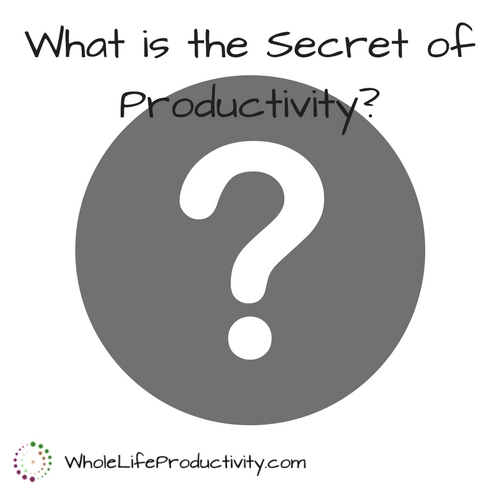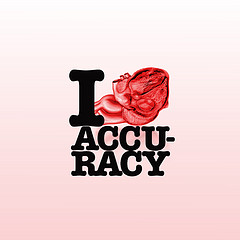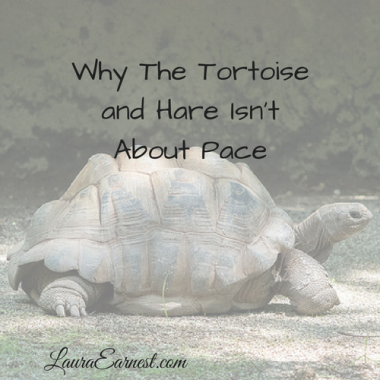
The Secret of Productivity
What is the secret of productivity? You might be surprised.
I have studied productivity for a long time. I have used all the major planners, systems and schools of thought. And all that time, I really didn’t get much done. Sure, I kept up on the little stuff. My house was clean, the laundry was done, and my client work solid and maintainable. But the big stuff? Not so much.
A Definition of Productivity
Productivity can be defined as doing the right tasks in the right way. In this definition we take on efficiency (right way) as well as effectiveness (right tasks). Efficiency is getting the task at hand done without excess effort and deviation. But what is effectiveness?
Tasks can be divided into low-value and high-value tasks. So how do we know what the right tasks are? They are never low-value tasks.
Low-value tasks include things like answering emails; attending meetings; rearranging your desk; cleaning your hairbrush; eating lunch; pruning the bushes. Generally they are tasks that could be performed by anyone with little training. I’m not saying that you shouldn’t do these things or that they are unimportant, just that they have low value when you look at them from the perspective of the goals you are trying to reach.
High-value tasks, on the other hand, are those tasks that move you toward your goals. They are the tasks that would require extensive training or experience to do well.
A System Won’t Do It
Many people feel that if they just follow the right system, they will automatically be productive. And of course, if the system is complicated, it must work, right?
There is a danger in this thought. Maintaining a productivity system feels productive, but really isn’t. You’re doing meta-work: doing work about work.
To be truly productive, you need to avoid any productivity system that creates more low level work. That means that your productivity system should be as simple as possible to meet your needs, and not be burdensome for maintenance.
Doing Lots of Tasks Won’t Do It
Many people write out huge task lists, and cross thngs off during the day. Yet in spite of this, they do not get closer to their goals.
“But I’ve done so much!” they cry. Looking at the list, though, will find that it is filled with low-level tasks. Yes, they have been working, but at the wrong tasks. Of course they are never going to write a novel if they spend their time scrubbing the shower!
Doing lots of tasks may make you feel productive, but it will not move you closer to your goals.
A darker side of this is when people put the priority on those low-level tasks, and wonder why they never have time to work on their goals. This is fixed by prioritizing their high-level tasks, and getting them done before the low-level ones.
Adding Resources Won’t Do It
Many managers will throw extra resources at a project to make it move faster. If they add more people, they are puzzled why things slow down. If they add more time, they wonder why things stretch out. And if they add more money, things get more complex.
(Dilbert is more true to life than most people realize, I think.)
Adding resources to a project won’t necessarily bring you any closer in the short term. Let’s say you are wanting to write a book, so you hire an assistant to take over all your administrative tasks. It’s a great idea, until you realize that you are going to have to spend the time to train the assistant.
Adding resources won’t get you any closer to your goals in the short term (although it may give you some time in the long term).
The Secret of Productivity
So what is the true secret of productivity? It doesn’t lie in a system, doing lots of (low-value) tasks, or in having an assistant.
The secret of productivity is to do the work. Do the high-value tasks before you do the low-value, and you will be productive.
Warning: this is a simple concept, but it is difficult to implement. Our society has trained us to crank widgets and crank fast. True productivity requires a mind shift and an understanding of what your high-value tasks are.
What Will Work?
We’ve looked at what won’t work to make you productive. So what will work?
- Know what your high-value tasks are. This is going to need some sort of tracking system, and it is going to need time and thought to determine what the high-value tasks are.
- Consistently work on high-value tasks. Even when you don’t want to, hit those high-value tasks when you have the most energy.
- Work with what you have at the moment. Waiting until you have more time, money or help is a form of procrastination.
Conclusion
Productivity can’t be found in a system, doing lots of things, or having a staff. True productivity that moves you toward your goals will come from consistent action on those goals.
Over to you: your task for today is to find a high-value task that will move you toward your goal…and do it!




